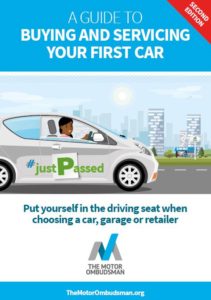The Motor Ombudsman’s Top Tips for buying a used car
The following are some top tips to take into consideration before signing on the dotted line when you’re looking to buy a used car – whether this is for the first time, or a repeat purchase.
1. Take the time to do your research
- Used cars come in all shapes and sizes, specification, and price. Therefore, spend time doing your research to find the vehicle that is right for you in terms of practicality, comfort, and lifestyle – whether this is a city car, an SUV, or something a little more sporty. Also bear in mind that used cars can have a manual or automatic gearbox.
- As well as reading online reviews and road-test reports in the media, you can also carry out your own practical research in the form of on-the-road test drives, which is explained in more detail later in this guide.
2. There’s a growing choice of used EV models
- There’s an increasing number of fully-electric (EV) models coming on to the second-hand (used car) market, and this may be the first time that you’re considering buying a car powered by batteries and motors, rather than an engine.
- Think about your lifestyle and the distances you normally drive to help determine whether an EV is right for you, as well as where you can charge it (i.e. a driveway or on-street), and the expected cost of doing so.
- The amount of charge EV batteries can hold decreases over time. Therefore, ask for documentation on “battery health” to show expected performance / the “life” that is left in the batteries when charging.
- This will also have an impact on range (the maximum distance that you can travel on a full charge), whilst the weather, terrain, and vehicle usage can also affect it too.
3. Buy from a Motor Ombudsman-accredited retailer
There are thousands of used car retailers across the UK, but for added peace of mind, look for ones locally or further afield that are signed up to The Motor Ombudsman’s Vehicle Sales Code.
TMO TOP TIP: The Motor Ombudsman’s online Garage Finder is a quick and easy way to search for reputable independent retailers and franchise dealers across the UK that are committed to the Vehicle Sales Code.
What are some of the key advantages of buying a used car from an established and reputable Motor Ombudsman-accredited retailer?
- Buying from an established and reputable Motor Ombudsman-accredited retailer means a car has undergone comprehensive checks prior to sale (normally as part of an Approved Used programme), and the seller is committed to the highest standards of service.
- If something goes wrong, you will have access to The Motor Ombudsman’s free-of-charge Alternative Dispute Resolution (ADR) service to help conclude any complaints fairly and in an impartial environment, if you have not been able to resolve any issues with the seller in the first instance.
- Buying from a reputable retailer will also give you a fully transparent view of the car’s condition and history (i.e. to make sure that it is clear of any finance, it has not been involved in an accident or is a stolen vehicle etc, and that the Vehicle Identification Number (VIN) matches the one on the V5C logbook) to be able to make a fully informed purchase, and steer clear of any hidden and potentially costly surprises during ownership.
4. Purchasing a used car privately carries added risks
- It may be tempting to make savings in the shorter term by buying from a private individual after seeing a social media advert or a car parked at the roadside. However, this could prove to be a false economy, as repair bills may mount up in the longer term, and turn a car into an unwanted expensive liability.
- It’s also worth bearing in mind that The Motor Ombudsman is unable to help with any disputes if something goes wrong after buying a car from a private individual, and you also have less protection from the law, compared to if you had used a physical retailer.
5. Take a look at longer-term affordability
- When buying a used car, it is important to take into account the longer-term running costs, not just what your budget it is at the time of buying the car which, for many, often means putting down a deposit – a percentage of the purchase price, to take ownership.
- Before signing on the dotted line, take your time to work out the car’s running costs alongside other household bills, so that it doesn’t put an unnecessary strain on your finances.
The following is a checklist of some of key costs to keep front of mind when running a car:
- Monthly finance repayments (if the car has not been paid for outright)
- Fluctuating charging tariffs and petrol / diesel prices
- Vehicle Excise Duty (road tax) – which varies with the car’s emissions
- Insurance
- Breakdown cover
- Vehicle maintenance and the cost of replacement components, such as tyres and brake discs, which wear with vehicle usage
- An extended warranty to cover the cost of mechanical and electrical component breakdowns
- A service plan to help spread out the cost of annual routine maintenance
- Congestion charges
6. Test drive the cars you’re interested in
- Test drives are an important part of buying a used car. In fact, they are an ideal opportunity to get practical experience of what the car will be like to use on a day-to-day basis, whilst also giving you the chance to ask questions whilst out on the road.
- Test drives equally give first-hand experience of whether equipment, such as child car seats, pushchairs, bicycles, and golf clubs, all fit within your shortlisted vehicles, alongside the expected number of adults and/or children that you plan to have in the car on a regular basis.
TMO TOP TIP: Remember to take your driving licence along with you to the retailer along with any other equipment to make sure that they fit in the cars you’re interested in.
7. Don’t be afraid to negotiate
- When speaking to the retailer, or when visiting their premises, don’t be afraid to negotiate on the list price with the seller, which is where your research will prove valuable to potentially help secure any discounts or an enhanced deal.
- As part of your research, take a look online to see what other similar models have sold for, as well as guides, which give an indication of the expected purchase price for the condition, age and mileage of the used car that you are looking at.
8. Knowledge is power
- For added peace of mind, it’s always worth taking someone along that knows what to look out for in terms of the condition, faults or issues, or enlisting the services of a qualified mechanic to take a good look at the vehicle before buying it.
9. Consider taking out an extended warranty
- If the original manufacturer’s warranty on the vehicle has expired (this will typically be between three to seven years in duration), taking out an extended warranty from a Motor Ombudsman-accredited provider is a great way to cover the sometimes significant costs of repairing a car should it suffer a fault.
- Warranties vary in their level of cover, so take the time to read through the policy information, as well as the terms and conditions which highlight what you can and cannot claim for in the event of an issue, and what you need to do as the owner to maintain the validity of the policy (e.g. to keep the car serviced in line with the manufacturer’s recommended intervals).
10. Check everything thoroughly before signing on the dotted line
- Before signing on the dotted line, and making a legal commitment to buy a car, and to help prevent any complications down the road, it is important to read any paperwork thoroughly to check that all information is correct, and that you understand the terms and conditions (i.e. the small print) in full. This applies to the order form, any invoices, the initial deposit, the finance and warranty agreements.
11. Understand how the car works
- Getting the keys to your new car is often an exciting time. However, before driving off the forecourt, it is worth spending the time doing a walk-around with a member of staff, to ensure that you are satisfied with the interior and exterior condition of the car, and are comfortable with how any controls and systems work, as these can differ between models.
- In addition, before you leave the retailer, check that you have all the promised documentation relating to the car, including the handbook, the vehicle history (such as MOT certificates (if printed), the stamped service book, and any receipts for any payments you have made, as well as those kept by the previous owner.
12. And above all…Take your time!
- Buying a car can be a daunting experience for some, with so much to take into consideration, whilst it is often a significant financial commitment.
- Therefore, avoid rushing into a decision, and it may take time to find the perfect car that meets your criteria and budget, so patience is also key!
OTHER HANDY MOTOR OMBUDSMAN RESOURCES
Take a look at some of our other handy resources before buying a used car:
The Motor Ombudsman’s Knowledge Base (which includes dedicated categories on used cars and electric vehicles)
The Motor Ombudsman’s #JustPassed guide on buying and servicing a car for the first time




